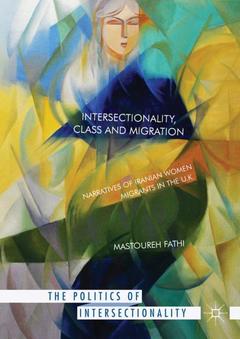Intersectionality, Class and Migration, 1st ed. 2017 Narratives of Iranian Women Migrants in the U.K. The Politics of Intersectionality Series
Auteur : Fathi Mastoureh

1. Class, intersectionality and Iranian diaspora
1.1 Iranian women’s employment and class
1.2 Iranian migrants and social class
1.3 Making sense of class in migration: co-constructing narratives
1.4 Iranian parties, concerts and doctors’ hubs
1.5 Religion, an absent theme in class stories
1.6 Outline of the book
2. Intersectionality and Translocational Class
2.1 Classic literature of class and the question of intersectionality
2.1.1Marxism and class
2.1.2 Status and class
2.1.3 The cultural turn to class
2.2 Intersectionality and the treatment of class
2.2.1 Situated intersectionality2.2.2 Power relations and intersectionality
2.2.3 Privileged position and intersectionality
2.3 Identity and translocational positionality
2.3.1 Translocational class
2.4 Conclusion
3. Classed and Gendered Growing up
3.1 Educational surveillance
3.1.1 Creating ambition: Passing on class to the girls
3.1.2 Mothers and class surveillance
3.1.3 Lack of choice or destined pathways?
3.1.4 Governing the ambition
3.2 Normalisation of the pathways
3.2.1 Lack of ambition as deviant
3.2.2 Not discussing class to construct classed identity
3.2.3 Embarrassment and normalisation
3.2.4 Westernisation as a ‘normal’ pathway
3.3 The making of a moral self
3.3.1 Respect3.4 Conclusion
4. Classed Place-making
4.1 Diasporic spaces
4.2 Countries
4.3 Schools
4.4 Neighbourhoods
4.5 Spatial class: a conclusion
5. Classed Performing
5.1 Class-coded acts
5.1.1 Class and performance: a delicate relationship
5.1.2 Performing class-coded acts
<5.2 Feminine doctors: femininity and educational capital5.2.1 ‘Owning’ the doctor’s role: being authentic
5.2.2 Classed performance and morality<
5.3 Compulsory Class
5.3.1 Imagined images, real differences
5.4 Translocational class performances: a conclusion
6. Classed Racialisation
6.1 Being racialised
6.2 Racialising others
6.3 Racialisation in class construction
6.4 Conclusion
7. Classed Belonging
7.1 Foreignness, power and class
7.1.1 Is there a glass ceiling in British society?
7.1.2 ‘I make here my soil. I make here my country’
7.2 ‘Others’ and the hierarchies of belonging
7.2.1 ‘Deserving’ to belong
7.3 Conclusion
8. Understanding Class Intersectionally: A Way Forward
8.1 Situated understanding of class <8.2 Intersectionality and class
8.3 Social locations, relations and localities
8.4 Complexity of social class
Features rare scholarship that studies case studies of Iranian migrants under the lens of social class
Analyzes class in a novel variety of different contexts, including gender, ethnicity, place and belonging
Based on empirical research of oft-overlooked migrant groups: women working as doctors, academics, and other traditionally esteemed professions
Includes supplementary material: sn.pub/extras
Date de parution : 10-2017
Ouvrage de 193 p.
14.8x21 cm
Disponible chez l'éditeur (délai d'approvisionnement : 15 jours).
Prix indicatif 89,66 €
Ajouter au panierThèmes d’Intersectionality, Class and Migration :
Mots-clés :
Iran; Migrants; Skilled Labor; Belonging; Nation; Migrant; Native; Other; Assimilation; Class; Intersectionality; Gender; Iran; Britain; Brexit; Security; citizenship



